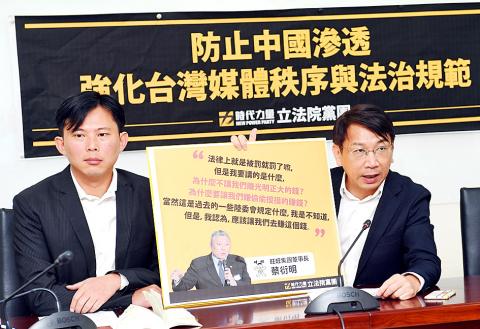The New Power Party (NPP) yesterday proposed amendments that would subject Taiwanese who lobby for Chinese political interests to prison sentences of up to three years and fines of NT$500,000 to NT$5 million (US$15,893 to US$158,932).
Under the drafts to the Act Governing Relations Between the People of the Taiwan Area and the Mainland Area (臺灣地區與大陸地區人民關係條例), Taiwanese individuals and organizations would be banned from lobbying for the political interests of the Chinese government, political parties or organizations that might affect Taiwan’s national security or interests, NPP Legislator Huang Kuo-chang (黃國昌) told a news conference.
While the 2007 Lobbying Act (遊說法) already bans Chinese individuals and organizations from lobbying for their political interests or having others lobby on their behalf, the provision does not entail any punishment and is “almost useless,” Huang said.

Photo: CNA
While a number of officials have advocated the introduction of a law similar to the US’ Foreign Agents Registration Act, mere transparency would not be sufficient for Taiwan, he said.
The US act, passed in 1938, requires individuals and organizations controlled by foreign governments or organizations to disclose such connections, as well as information about their activities and finances, Huang added.
The drafts are part of a series of amendments proposed by the NPP to enhance protection of the nation’s democracy and security against Chinese infiltration, NPP caucus convener Hsu Yung-ming (徐永明) said.
The party has also proposed amendments to broadcasting laws and the National Security Act (國家安全法) to tighten regulations on media companies controlled by the Chinese government or organizations, and on publishing Chinese Communist Party propaganda, he added.
As many bills are still under review with the legislative session expected to end in a few weeks, Hsu said that he hopes Legislative Speaker Su Jia-chyuan (蘇嘉全) would extend the session to allow more time for discussion.
“In her speech [on Monday] to mark her inauguration anniversary, President Tsai Ing-wen (蔡英文) listed protecting Taiwan’s sovereignty as one of her major achievements,” he said.
Since all three draft amendments are in line with that goal, they should receive support from legislators across party lines and pass soon, Hsu added.

DAREDEVIL: Honnold said it had always been a dream of his to climb Taipei 101, while a Netflix producer said the skyscraper was ‘a real icon of this country’ US climber Alex Honnold yesterday took on Taiwan’s tallest building, becoming the first person to scale Taipei 101 without a rope, harness or safety net. Hundreds of spectators gathered at the base of the 101-story skyscraper to watch Honnold, 40, embark on his daredevil feat, which was also broadcast live on Netflix. Dressed in a red T-shirt and yellow custom-made climbing shoes, Honnold swiftly moved up the southeast face of the glass and steel building. At one point, he stepped onto a platform midway up to wave down at fans and onlookers who were taking photos. People watching from inside

A Vietnamese migrant worker yesterday won NT$12 million (US$379,627) on a Lunar New Year scratch card in Kaohsiung as part of Taiwan Lottery Co’s (台灣彩券) “NT$12 Million Grand Fortune” (1200萬大吉利) game. The man was the first top-prize winner of the new game launched on Jan. 6 to mark the Lunar New Year. Three Vietnamese migrant workers visited a Taiwan Lottery shop on Xinyue Street in Kaohsiung’s Gangshan District (崗山), a store representative said. The player bought multiple tickets and, after winning nothing, held the final lottery ticket in one hand and rubbed the store’s statue of the Maitreya Buddha’s belly with the other,

‘NATO-PLUS’: ‘Our strategic partners in the Indo-Pacific are facing increasing aggression by the Chinese Communist Party,’ US Representative Rob Wittman said The US House of Representatives on Monday released its version of the Consolidated Appropriations Act, which includes US$1.15 billion to support security cooperation with Taiwan. The omnibus act, covering US$1.2 trillion of spending, allocates US$1 billion for the Taiwan Security Cooperation Initiative, as well as US$150 million for the replacement of defense articles and reimbursement of defense services provided to Taiwan. The fund allocations were based on the US National Defense Authorization Act for fiscal 2026 that was passed by the US Congress last month and authorized up to US$1 billion to the US Defense Security Cooperation Agency in support of the

HIGH-TECH DEAL: Chipmakers that expand in the US would be able to import up to 2.5 times their new capacity with no extra tariffs during an approved construction period Taiwan aims to build a “democratic” high-tech supply chain with the US and form a strategic artificial intelligence (AI) partnership under the new tariffs deal it sealed with Washington last week, Taipei’s top negotiator in the talks said yesterday. US President Donald Trump has pushed Taiwan, a major producer of semiconductors which runs a large trade surplus with the US, to invest more in the US, specifically in chips that power AI. Under the terms of the long-negotiated deal, chipmakers such as Taiwan Semiconductor Manufacturing Co (TSMC, 台積電) that expand US production would incur a lower tariff on semiconductors or related manufacturing